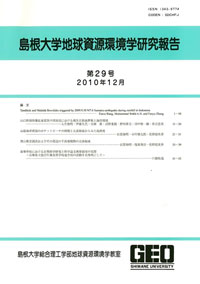島根大学総合理工学部地球資源環境学教室
ISSN:1343-9774

number of downloads : ?
Use this link to cite this item : https://ir.lib.shimane-u.ac.jp/6107
Geoscience reports of Shimane University 21
2002-12-27 発行
Organic carbon and carbonate contents of black shales from the lower Cretaceous Paja Formation (Colombia) by loss on ignition and CHNS analysis: comparison of methods
File
Description
Organic matter(and hence organic carbon)and calcium carbonate contents of soils and sediment can be estimated by simple loss on ignition(LOI)determinations,at temperatures ranging from 375 to 550℃ and 850-1000℃,respectively.
Organic matter(OM)and carbonate contents of 24 carbonaceous black shale samples were determined by LOI and CHNS methods to compare these two techniques.Two LOI tests were carried out to determine the ignition times required at 550℃ and 1000℃ to ensure complete combustion of the OM and carbonate components.Results showed 4 to 6 hours of exposure at 550℃ were required to ignite the OM,and 3 hours further ignition at 1000℃ ensured decomposition of the carbonate.A complete set of sample were then ignited under these conditions,and the results compared with those from CHNS analysis.Although the results correlated well,LOI_550 values(OM)were consistently greater than C_org by CHNS.Correction of the LOI data using a generic OM to C_org conversion factor commonly applied in the literature did not improve the results.A third experimental run with LOI determinations at 375℃,550℃,and 1000℃ showed a strong correlation between LOI_375 and C_org(CHNS),but relatively constant loss of weight(2-4 wt%)between 375℃ and 550℃ irrespective of C_org content.This suggests most of the weight loss below 375℃ was due to combustion of OM,whereas that between 375℃ and 550℃ was structural water lost from clays.Nevertheless,ignition at either 375℃ or 550℃ can give reasonable estimates of C_org ontent,provided calibration data for individual sample suites is available from an independent technique such as CHNS analysis.The results support proposals that use of generic OM to C_org onversion factors is inappropriate.Test of the viability of carbonate content determination was hampered by the non-calcareous nature of most of the samples.At low levels,neither LOI_1000 nor CHNS seem to give good results.This is probably due to continued loss of structural water and other volatile phases,coupled with weight gains through oxidation of species such as Fe^<2+> and Mn^<2+>.
Organic matter(OM)and carbonate contents of 24 carbonaceous black shale samples were determined by LOI and CHNS methods to compare these two techniques.Two LOI tests were carried out to determine the ignition times required at 550℃ and 1000℃ to ensure complete combustion of the OM and carbonate components.Results showed 4 to 6 hours of exposure at 550℃ were required to ignite the OM,and 3 hours further ignition at 1000℃ ensured decomposition of the carbonate.A complete set of sample were then ignited under these conditions,and the results compared with those from CHNS analysis.Although the results correlated well,LOI_550 values(OM)were consistently greater than C_org by CHNS.Correction of the LOI data using a generic OM to C_org conversion factor commonly applied in the literature did not improve the results.A third experimental run with LOI determinations at 375℃,550℃,and 1000℃ showed a strong correlation between LOI_375 and C_org(CHNS),but relatively constant loss of weight(2-4 wt%)between 375℃ and 550℃ irrespective of C_org content.This suggests most of the weight loss below 375℃ was due to combustion of OM,whereas that between 375℃ and 550℃ was structural water lost from clays.Nevertheless,ignition at either 375℃ or 550℃ can give reasonable estimates of C_org ontent,provided calibration data for individual sample suites is available from an independent technique such as CHNS analysis.The results support proposals that use of generic OM to C_org onversion factors is inappropriate.Test of the viability of carbonate content determination was hampered by the non-calcareous nature of most of the samples.At low levels,neither LOI_1000 nor CHNS seem to give good results.This is probably due to continued loss of structural water and other volatile phases,coupled with weight gains through oxidation of species such as Fe^<2+> and Mn^<2+>.
Other Article
